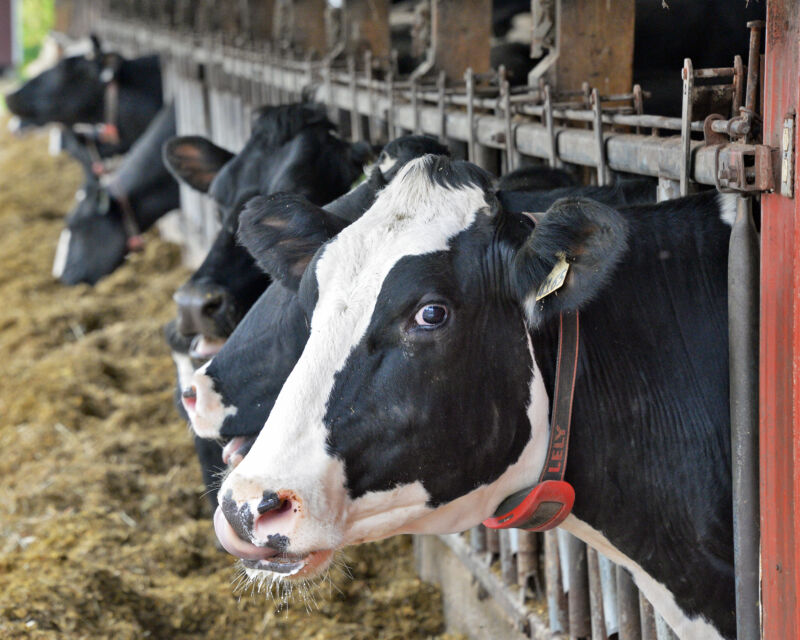
Another dairy farm worker in Michigan has been infected with avian influenza virus, state and federal health officials reported Thursday.
The case marks the third time the outbreak of bird flu in milking cows is known to have spilled over to a human. The dairy farm worker in Michigan, like the others, had close contact with H5N1-infected dairy cows, suggesting another case of cow-to-human transmission.
But the case reported today is notable for being the first one involving respiratory symptoms. In the first two cases, the dairy workers (one in Texas, the other in Michigan) reported only eye infections (conjunctivitis). This third case—also in Michigan but from a different farm—reported upper respiratory symptoms, including cough, congestion, and sore throat, as well as eye discomfort and watery discharge, but not conjunctivitis. The worker was given an antiviral (Tamiflu) and is said to be recovering. No other workers on the farm have shown symptoms, and the worker’s household contacts are being monitored.
In a statement Thursday, the chief medical executive for Michigan’s health department, Natasha Bagdasarian, explained that the latest case appeared to have a different exposure than the previous case in the state.
“With the first case in Michigan, eye symptoms occurred after a direct splash of infected milk to the eye,” Bagdasarian said. “With this [new] case, respiratory symptoms occurred after direct exposure to an infected cow. Neither individual was wearing full personal protective equipment (PPE).” Bagdasarian added that the state has “not seen signs of sustained human-to-human transmission, and the current health risk to the general public remains low.”
In a call with journalists Thursday afternoon, Nirav Shah, principal deputy director for the Centers for Disease Control and Prevention, emphasized that respiratory symptoms are the norm for influenza virus infections in humans, including H5 infections. Though the respiratory symptoms are not surprising, he added that they do pose more risk than a person with an eye infection. “Simply put, someone who’s coughing may be more likely to transmit the virus than someone who has an eye infection, like conjunctivitis,” Shah said.
Between 2003 and April 2024, the World Health Organization documented 889 human cases of H5N1 in 23 countries, leading to 463 deaths, which indicates a 52 percent case fatality report.
But, since the current global outbreak of H5N1 in wild birds began to flare in 2021 and spread to other species, officials documented only 28 H5N1 infections in humans as of April, according to a joint report last month from the WHO, the Food and Agriculture Organization of the United Nations, and the World Organization for Animal Health. The report does not include the two latest cases from Michigan, both reported this month. Nearly all of the reported cases had documented exposures to infected animals.
At least eight of the 28 earlier cases were deadly, according to WHO data. China reported two cases between 2021 and 2024, one of whom died, and the other was hospitalized with severe pneumonia. In Cambodia, five of 11 cases were fatal. Vietnam reported two cases, one of which was fatal; and India reported a single fatal case. But the joint report notes that all of the cases reported in the US and Europe in recent years have been asymptomatic or mild.
“The variation in disease outcome of H5N1 patients is likely due to a number of factors, including, virus genotype, viral load in the infectious material they were exposed to, underlying health conditions, duration of exposure, personal protective equipment used at the time of exposure and route of transmission,” the report concludes.
For now, the CDC emphasizes that the risk for the general public remains low. However, the cases in farm workers highlight the risk to those who have exposure to animals, particularly dairy farm workers. The recent US cases tell us “that direct exposure to infected livestock poses a risk to humans, and that PPE is an important tool in preventing spread among individuals who work on dairy and poultry farms,” Michigan’s Bagdasarian said. To date, the CDC reports that over 40 people in the US have been tested for H5N1, and over 350 people have been monitored, including 220 currently under monitoring in Michigan. To date, four people have tested positive for H5N1 in the US, the three dairy farm workers connected to the dairy cow outbreak, as well as a 2022 case in a Colorado farm worker exposed to infected poultry.
The US Department of Agriculture reports H5N1 infections in at least 66 herds across nine states.
In the case that the virus gains the ability to spread among humans, the US health department is working to manufacture 4.8 million doses of well-matched H5 influenza vaccines, which should be ready later this summer, officials noted in the press briefing today. For now, officials declined to discuss how vaccines would be distributed or prioritized in the event of a human outbreak.
